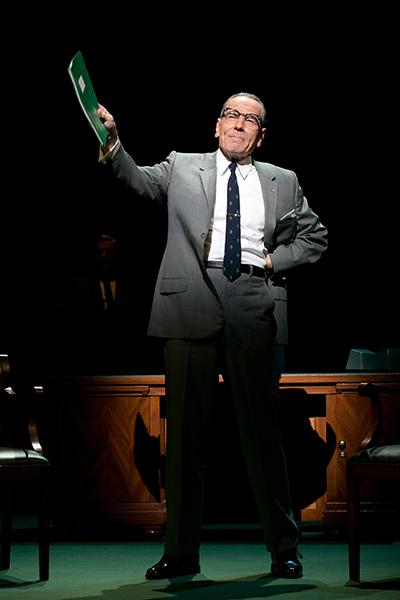
Ah, American politics. A federal government so dysfunctional a single issue such as health care can cause a stalemate, a shutdown and an ideological war. A bureaucracy divided by battle lines so sharp they draw nightly geysers of blood from Fox News and MSNBC. Was it always thus? Judging by some of our most talented playwrights, among them Pulitzer-winner Robert Schenkkan, whose new drama, All the Way, runs through June 29 at Broadway’s Neil Simon Theater, the answer is an emphatic, bitter but not fully disillusioned “yes.”
I recall a critic friend telling me about the first time he saw the Broadway musical 1776. After all the finger pointing and bad blood, he said, “When the curtain came down on the first act, I thought, ‘That’s it. There’s never going to be an America.’”
Fast-forward to 2004 and Stuff Happens, David Hare’s take on the way George W. Bush coerced Britain’s Tony Blair into supporting the Iraq War. Everything becomes a morass of cajoling, hidden threats and direct implications: Do this for us and for your own good, and we’ll be your best buddy. For now. Tony Kushner’s screenplay for the mostly superb “Lincoln” goes even further showing backroom deal making.
The catch for modern viewers is that in Spielberg’s film and in All the Way, the slimy handshakes are in the service of a good cause. In trying to abolish slavery, Lincoln’s advisers pretty much have to bribe their way towards the 13th Amendment. Southern politicians are again the obstacle in All the Way, where newly installed president Lyndon Johnson yearns to pass a civil-rights bill, only to see it whittled down, and frozen in committee even as it causes a rift in the Democratic party (one that essentially led to today’s right-wing, Republican Tea party).
That Johnson gets the Civil Rights Act passed in some form remains a feather in the cap of a president too often remembered solely for his Vietnam nadir, and Schenkkan, a Pulitzer-winner for his American-history-at-gunpoint epic, The Kentucky Cycle, only hints at LBJ’s troubles to come. In fact, All the Way, with its three-hour running time and galvanic central performance by Bryan Cranston, feels like two-thirds of a three-act tragedy. We see the heroic but flawed commander in chief resorting to charm, pressure, bullying and bait to get what he wants. We also see his self-doubt, growing paranoia and ability to turn on a dime, as when he repeatedly promises an eager Senator Humphrey (Robert Petkoff) the vice presidency but just as often threatens to pull that rug out from under him at any sign of weakness from the well-meaning but less than politically savvy Hubert.
Cranston, with craggy voice and more energy than 10 political conventions put together, is a wonder to watch. It is literally thrilling to see him ramp up from the opening scene of dumbfounded shellshock (at the news that he’s to be sworn in following the death of JFK), to being dressed by his aides while fielding phone calls from the likes of Martin Luther King (a fine Brandon J. Dirden), his put-upon wife Lady Bird (Betsy Aidem) and political mentor and soon-to-be adversary, Senator Richard Russell (the ever-terrific John McMartin). Schenkkan makes it clear that this LBJ has good motivations at his core—he really does believe in equal rights—but in every interaction, he subverts whatever he may truly be feeling to the needs of that moment. He’ll say or do whatever he has to, and then punish himself later.
By the time Johnson gets dispatches from Secretary of Defense Robert McNamara about questionable activity in the Gulf of Tonkin, we don’t need an act three to see how Johnson’s stubbornness, insecurity, and enemies will tarnish a legacy that could have been defined by his legislations on gun control, voting, housing, and social security. It’s a shadow that stretches far, but not all the way.
